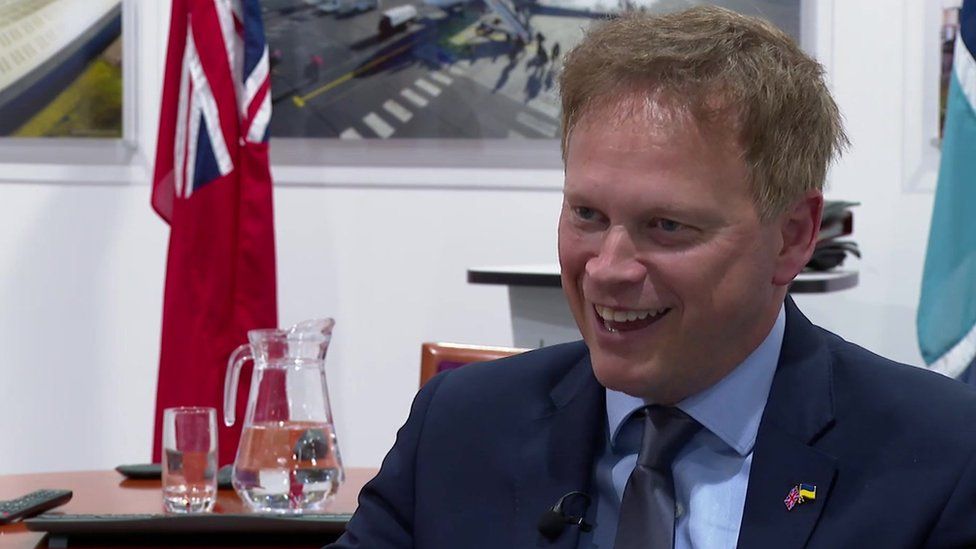Shapps: Rail strikes 'could be easily settled'
- Published
- comments

Transport Secretary Grant Shapps has said that rail strikes could be "easily settled" by modernising "antiquated" working practices.
He described calls for him to intervene to settle the ongoing dispute between the RMT transport union and rail employers as a "red herring" and a "stunt".
Outdated practices "had to end" for a resolution to be possible, he said.
But the RMT union said that Mr Shapps was "talking complete nonsense".
In an interview with the BBC, Mr Shapps acknowledged that he and the Treasury had set an overall mandate, which dictated how much money was available, and that he had final sign-off on what was agreed.
But he said he didn't, and shouldn't, interfere with the detail of negotiations between the RMT and the industry, saying employers were "the only people who could settle this strike".
Thousands of members of the RMT who work for Network Rail and 13 train companies walked out on Tuesday, Thursday and Saturday last week.
Half the rail network was closed on strike days, while the knock-on impact meant services were also disrupted on the following days. The union has warned more strike action could follow.
The Transport Secretary told the BBC the dispute could "easily be settled because there are so many modernisations from antiquated work practices - for example, two vans often have to be sent to a maintenance job when only one van is required."
The RMT said in a statement prior to Mr Shapps' comments that sending several vans "is both a safety and engineering standards issue.
"It would be pointless sending staff to a location without their gear, equipment and tools which is why the vehicles and associated equipment are sent to site" in more than one van.
"Steam age"
The Transport Secretary said "we want to upgrade our railways, make them digital-fit for the 21st century. We also simultaneously need the working practices to come out of the 20th century - we can't have a digital railway, and sort of steam age working practices going alongside of it."
Mr Shapps accused unions of not allowing workers to fill in digital timesheets. Some train companies already have Sunday work as part of their normal rota, but he said "the ones that don't, need to".
The RMT responded: "Network Rail is intending to consult in the use of digital time sheets. We have not rejected them... We have no principled opposition to the introduction. We do use digital time sheets... on other parts of the railways." It also previously said that: "In many companies we have agreements that Sunday forms part of the working week."
The RMT has already rejected a pay offer totalling an uplift of 3%. Network Rail has insisted more would be possible, if modernised working practices were accepted.
It has said that 1,800 job losses that would come with those reforms could likely be achieved through voluntary redundancy.
But the union is demanding a guarantee of no compulsory redundancies.
Asked why a guarantee of no compulsory redundancies couldn't be put forward in writing, the Transport Secretary said it was something the RMT needed to discussed with employers.
However, he added "in what business… would you be able to say: we will never have to lose anyone from their jobs?". He pointed out that previous voluntary redundancy schemes had been over-subscribed.
Mr Shapps refused to put a figure on what pay increase would be possible if all the proposed changes to working practices were brought in. Nor would he say whether 7% would be too much.
He acknowledged that he knew how much money was available for a pay rise, but insisted it was a matter for the employers in the negotiations. "I can't discuss it on national TV. If I were to do that, I would effectively be intervening on those discussions".
However, he added: "What we do know is we've got a spike in inflation - we do not want to see that built in to the system [and] end up going forward for years as it did in the 1970s".
Mr Shapps did not directly respond to the question of whether the government would be prepared to put in any more money, if it provided the flexibility to prevent another strike.
But he said "we still have working practices which go back to the 50s and 60s and 70s. And that has to end. The strike can't be resolved without those things ending."
He went on: "There are so many things that are required to bring this railway up to date in terms of the working practices. Then, in a way, that actually does provide the opportunities to get a good decent settlement".
He said because many people had spent two years working from home, the only people being hurt by strikes were people who have to go to work: "the hospital porter, the cleaner, people who have no other option".
Mr Shapps said the outcome of the dispute would affect how much fares would rise next year.
"If we want decently low fare rises, of course, we have to have the costs of the railway lower and that means running them more efficiently. And that's all these working practices from the steam age that I'm afraid are time-expired."
Annual fare rises on regulated tickets are normally calculated using the UK RPI figure of inflation for July. RPI climbed to 11.7% in May. Next year's fare rise has not yet been set.
- Published20 June 2022